Summative Alternate ELPAC Content
Sample SSR
Sample SSRs are provided here. The callouts on the samples correspond with the links in the numbered list. Select a link for more information about that section of the SSR.
Data displayed on the samples in this guide are for demonstration purposes only and do not reflect valid data. SSR samples may include minor variances from actual SSRs.
Refer to the Summative Alternate ELPAC Reporting Criteria subsection for information about the criteria required for a student to receive an SSR.
Page 1
- Student Information
- What Is the Summative Alternate ELPAC?
- What Do the Scores Mean?
- Additional Resources
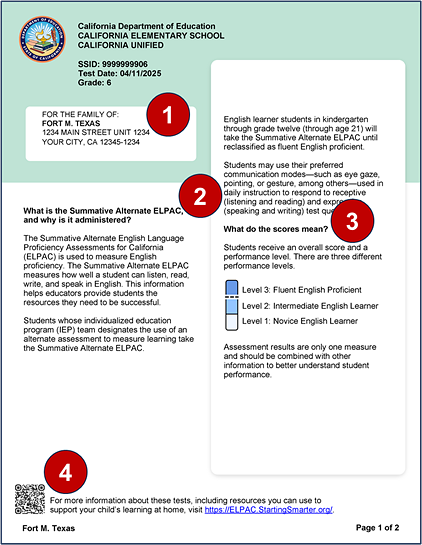
Figure 1. Sample Summative Alternate ELPAC SSR, page one
Page 2
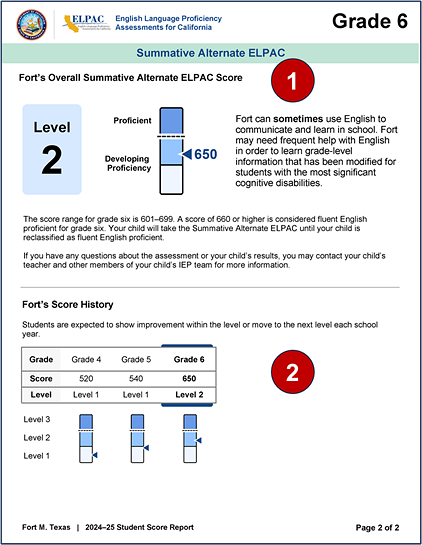
Figure 2. Sample Summative Alternate ELPAC SSR, page two
Description
The SSR for the Summative Alternate ELPAC, which provides parents/guardians with the student’s results, is described in table 1.
| Feature | Description |
|---|---|
|
Purpose |
To show a student’s performance on the Summative Alternate ELPAC to students and parents/guardians |
|
Format |
|
|
Action |
Pursuant to 5 CCR Section 11518.15(c), LEAs must notify parents/guardians and make SSRs available within 30 calendar days of their delivery to the LEA in TOMS. If the LEA receives the SSRs after the last day of instruction for the school year, the LEA shall make the SSR available to the parent/guardian no later than the first 15 working days of the new academic year. |
Summative Alternate ELPAC Reporting Levels
There are three possible reporting levels for the student’s overall Summative Alternate ELPAC score:
- Level 3—Fluent English Proficient
- Level 2—Intermediate English Learner
- Level 1—Novice English Learner
Additional Messaging
A student might have tested using an unlisted resource that was assigned by the LEA in TOMS. When the assigned unlisted resource changed the construct being tested, the following message, noted with an asterisk (*), appears on the second page of the SSR:
*An unlisted resource that changed the construct was used during testing; therefore, the student received the lowest score.
Figure 3 provides an example of how this indicator would appear next to the student’s overall score on page 2 of the SSR. In the example, there is an asterisk next to the overall score.
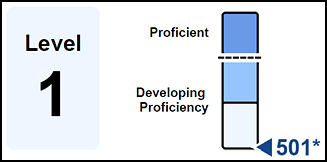
Figure 3. Overall score indicator
Front Page
The front page of an SSR always contains the student information and additional information described in the Common CAASPP and ELPAC SSR Page 1 General Information section in addition to the content described in the rest of this subsection.
What Is the Summative Alternate ELPAC?
Each SSR contains a brief program overview, including why it is administered (figure 4).
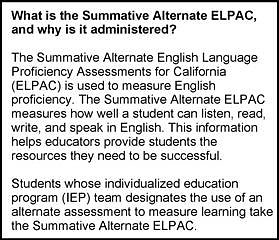
Figure 4. Program overview
What Do the Scores Mean?
Reporting for the Summative Alternate ELPAC features a performance level measurement gauge representing the three performance levels that are in the following order from top to bottom:
- Level 3—Fluent English Proficient
- Level 2—Intermediate English Learner
- Level 1—Novice English Learner
Each SSR contains a list of the performance levels for the overall assessment and a performance level measurement gauge that is divided into three parts, each representing one performance level, from Level 1 to Level 3 (figure 5).
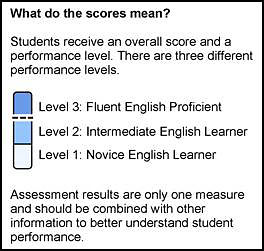
Figure 5. Scores information
Score Overview
Score ranges for each performance level are different for each grade level, and students are expected to show improvement within the level or move to the next level each school year. As a result, an increase in the overall scale score may not mean a higher performance level for the current year.
Overall Score
This section, which is presented in figure 6, shows the student’s score relative to the score range for the assessment. These are indicated in text and on a measurement gauge.
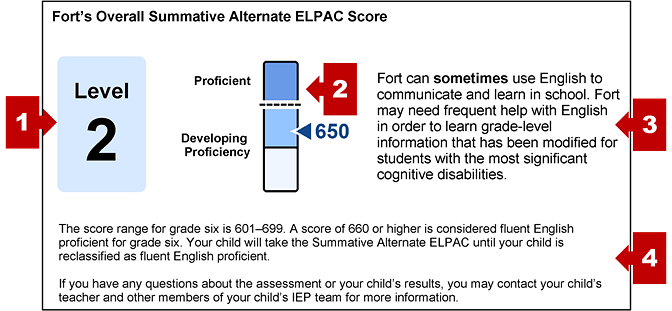
Figure 6. Overall score
| # | Feature | Description |
|---|---|---|
|
1 |
Performance level |
This box provides the student’s performance level. |
|
1 |
Special condition (Not shown) |
A cautionary message also will be included at the bottom of the page if the student had an unlisted resource that changed the construct being measured. |
|
2 |
Performance level measurement gauge |
A gauge is divided into three parts, each representing one of the performance levels, from Level 1 to Level 3. An indicator with the student’s score places the score within one of the performance levels; a dotted line between the first and second levels indicates proficiency. |
|
3 |
Performance summary |
This paragraph summarizes the student’s performance based on the student’s performance level for the assessment. Summaries are listed in the Performance Summary Text subsection. |
|
4 |
Score range |
This statement notes the score range for the grade-level assessment. |
Performance Summary Text
Possible performance summary outcomes for students are as follows:
- [Student’s name] has sufficient English skills to communicate and learn in school. [Student’s name] may need occasional help with English in order to learn grade-level information that has been modified for students with the most significant cognitive disabilities.
- [Student’s name] can sometimes use English to communicate and learn in school. [Student’s name] may need frequent help with English in order to learn grade-level information that has been modified for students with the most significant cognitive disabilities.
- [Student’s name] is beginning to develop the English skills to communicate and learn in school. [Student’s name] may need substantial help with English in order to learn grade-level information that has been modified for students with the most significant cognitive disabilities.
Score History
Scores are presented for a student’s prior two results on the Summative Alternate ELPAC (figure 7).
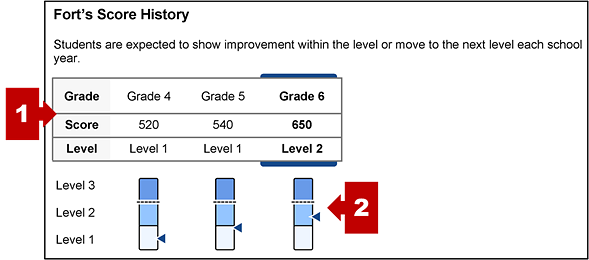
Figure 7. Score history
| # | Feature | Description |
|---|---|---|
|
1 |
Score history table |
Student scores and performance levels are presented in a table that shows, from left to right, the student’s score two years ago, one year ago, and as reported for the current test administration year. Refer to the Additional Messaging subsection for a list of messages that will display if there is no score for a particular previous-year test administration. |
|
2 |
Performance level measurement gauges |
Gauges with an arrow showing the student’s performance level within one of the three sections for each of the reported test administrations are presented immediately under the table in columns that align with the grade level reported. |
Additional Messaging
There might be a message present under the following circumstances for a previous-year Summative Alternate ELPAC administration:
- When the student was eligible and did not test, the score history for that administration shows as “Eligible but not tested.”
- When the student was not eligible to test in a prior year, the score history for that prior year will be blank.
- When the student was eligible and partially tested but did not answer one receptive and one expressive item, the score history for that administration shows as “Incomplete test | No score available.”
- When a student took the Summative Alternate ELPAC for the first time, the score history for that student shows as “[Student’s name] took this test for the first time this school year. [Student’s name] will have score history next school year.” However, note that a score history is shown for a student in kindergarten only if the student repeated kindergarten in the current test administration year and took the Summative Alternate ELPAC in the previous test administration.

